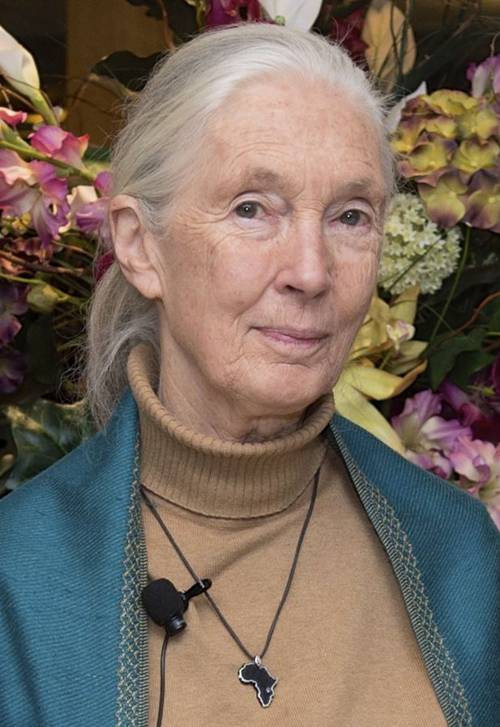
FAQ About Jane Goodall

Who is Jane Goodall?
Jane Goodall is a celebrated primatologist, ethologist, and anthropologist known for her pioneering research on chimpanzees in Tanzania. She is also a prominent advocate for environmental and wildlife conservation.

What is Jane Goodall famous for?
Jane Goodall is famous for her extensive study of chimpanzee social and family interactions. Her work unveiled that chimpanzees have complex emotions and behaviors similar to humans, challenging previous scientific assumptions.

Where did Jane Goodall conduct her research?
Jane Goodall conducted her groundbreaking research at Gombe Stream National Park in Tanzania, where she observed chimpanzees in the wild for many years.

When did Jane Goodall start her research on chimpanzees?
Jane Goodall began her research on chimpanzees in 1960 when she arrived at Gombe Stream National Park at the age of 26.

What are some significant contributions of Jane Goodall's research?
Jane Goodall's research significantly contributed to our understanding of primate behavior and ecology. She observed tool-making behaviors in chimpanzees, a trait once thought unique to humans, and her findings also highlighted the complex social structures and emotions within chimpanzee communities.

How did Jane Goodall's discovery change the scientific view of chimpanzees?
Jane Goodall's discoveries that chimpanzees use tools and exhibit emotions changed the scientific perception of animals, suggesting closer evolutionary ties between humans and primates and prompting a reevaluation of the distinctions between humans and other animals.

What organization did Jane Goodall found?
Jane Goodall founded the Jane Goodall Institute, an organization focused on wildlife research, conservation, and education. The institute aims to advance her vision of a healthier and more sustainable planet for all living creatures.

Has Jane Goodall received any awards for her work?
Jane Goodall has received numerous awards and recognitions for her contributions to science and conservation, including the Kyoto Prize, the Benjamin Franklin Medal in Life Science, and the title of United Nations Messenger of Peace.

What is the 'Roots & Shoots' program initiated by Jane Goodall?
The 'Roots & Shoots' program, initiated by Jane Goodall, is a youth-led initiative aimed at fostering global community service projects focusing on environmental care, animal welfare, and human community needs. It encourages young people to implement practical solutions in their communities.

What impact has Jane Goodall had on conservation efforts?
Jane Goodall has had a profound impact on conservation efforts by raising awareness about the plight of chimpanzees and other endangered species. Her advocacy has led to greater protection for chimpanzees and their habitats, as well as increased global engagement in environmental conservation.

What are some books written by Jane Goodall?
Jane Goodall has authored several influential books, including "In the Shadow of Man," "The Chimpanzees of Gombe: Patterns of Behavior," and "Reason for Hope: A Spiritual Journey." These works explore her research, conservation efforts, and philosophical reflections.

How has Jane Goodall inspired change in environmental policies?
Jane Goodall has inspired change in environmental policies through her advocacy, educational endeavors, and public speaking engagements. Her work has influenced legislation aimed at wildlife protection and promoted sustainable environmental practices worldwide.

What challenges did Jane Goodall face in her early career?
In her early career, Jane Goodall faced challenges such as working in a male-dominated field, limited access to formal scientific education, and the initial skepticism from the scientific community regarding her observational research methods.

How does Jane Goodall continue to contribute to environmental causes today?
Jane Goodall continues to contribute to environmental causes by actively engaging in global outreach, speaking at international forums, and through initiatives like the Jane Goodall Institute. She remains an influential advocate for the conservation of our planet's wildlife and natural resources.

Has Jane Goodall worked in other areas besides primatology?
Beyond primatology, Jane Goodall has worked extensively in environmental advocacy and humanitarian efforts. Her work includes promoting sustainable agriculture, protection of natural habitats, and collaborating with international bodies for conservation policy reforms.

How did Jane Goodall's approach to studying animals differ from her contemporaries?
Jane Goodall's approach was unique because she used personal observation and interaction rather than detached scientific study. She named the chimpanzees she studied, attributing them with personalities and emotions, in contrast to the scientific norms of assigning numbers.

What role did Louis Leakey play in Jane Goodall's career?
Louis Leakey, a prominent paleoanthropologist, played a critical role in Jane Goodall's career by hiring her as a secretary and encouraging her to study chimpanzees. He believed her observational skills and interest in animal behavior would greatly benefit primate research.

Did Jane Goodall have any formal scientific training before her research?
Jane Goodall did not have formal scientific training before starting her research in Gombe. Her insights were initially met with skepticism, but her findings were eventually embraced due to their scientific significance and rigor.

What philosophies guide Jane Goodall's conservation efforts?
Jane Goodall's conservation efforts are guided by philosophies of interconnectedness, individual responsibility, and hope. She believes in understanding the relationship between humans and nature and emphasizes the power of individual action in fostering global change.

What are the main goals of the Jane Goodall Institute?
The main goals of the Jane Goodall Institute are to promote wildlife conservation, improve the welfare of wild and captive animals, and encourage grassroots initiatives that lead to healthy ecosystems and sustainable communities.
